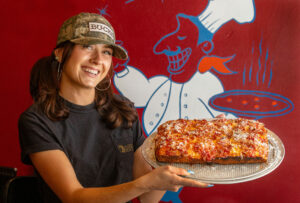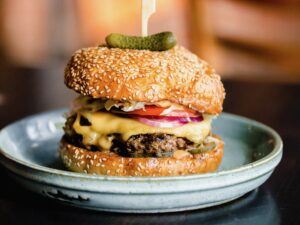Hip Chick Farms founders pay forward the help they’ve received.
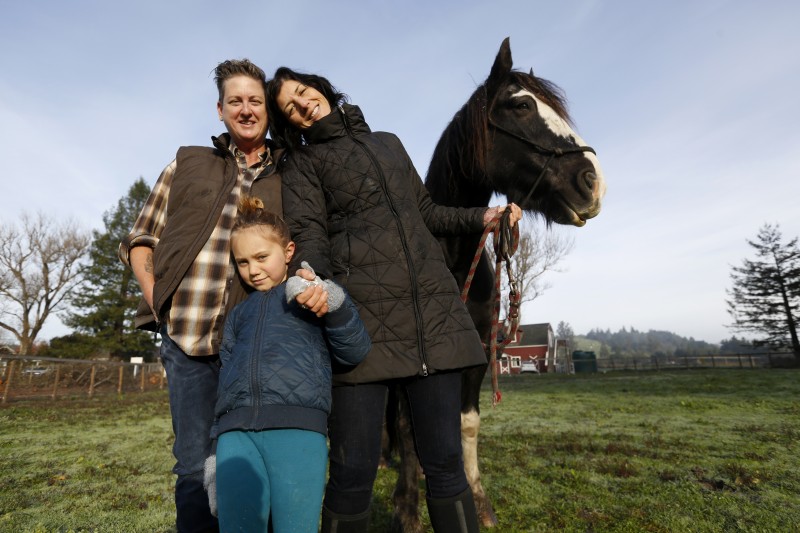
For Hip Chick Farms founders , the “aha” moment came about six years ago, when they realized how popular chicken fingers were with the kiddie crowd.
Johnson, then a personal chef for billionaires Ann and Gordon Getty in San Francisco, was also cooking for the 20-some children who attended the private Montessori School the Gettys had set up in their house for their granddaughter. From that experience, the Hip Chick idea was born: Why not create a branded line of organic, allnatural chicken bites that the rest of the world could enjoy?
Then came the “uh-oh” moment, when Palandech and Johnson began to realize how much effort and funding it would take to turn that bird into a business. This daunting task was made all the more challenging by their especially high standards. Non-negotiables included the use of premium California poultry like Mary’s Free-Range Chickens, hand-ground panko breading, soybean oil for frying, and no fillers.
“How hard could it be?” Palandech recently recalled thinking, as she relaxed in the sprawling ranch home and animal-rescue sanctuary she shares with wife Johnson and their 6-year-old daughter, Rubyrose, in Sebastopol.
“It was mind-blowing,” Johnson chimed in. “Red tape, and raising money was brutal.”
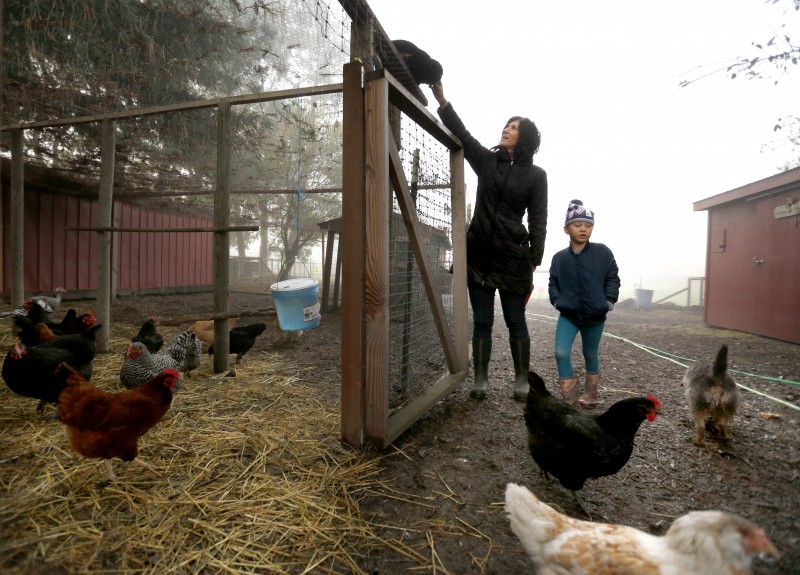
Still, they managed to launch the brand in 2013, and today Hip Chick Farms chicken fingers, wings, nuggets, meatballs and grilled strips are sold at more than 3,000 stores across the West Coast. The business has upgraded from an “office” centered around an orange leather chair and coffee table next to a stone fireplace in their living room, to commercial space on Main Street in downtown Sebastopol.
In October, Johnson — who spent nearly a decade as a chef with Alice Waters at Berkeley’s Chez Panisse — visited the White House to cook a meal for President Barack Obama and his staff. Now she’s working on new adult-oriented recipes for gourmet sausages, among other food items.
It sounds like the perfect, magical success story of two tenacious women breaking into the highly competitive frozen food arena, and dipping their toes into a largely male-dominated agribusiness. Except there were a lot of unexpected twists along the way, and they couldn’t have done it, the pair insists, without a whole lot of help from a whole lot of friends in their Sonoma County community.
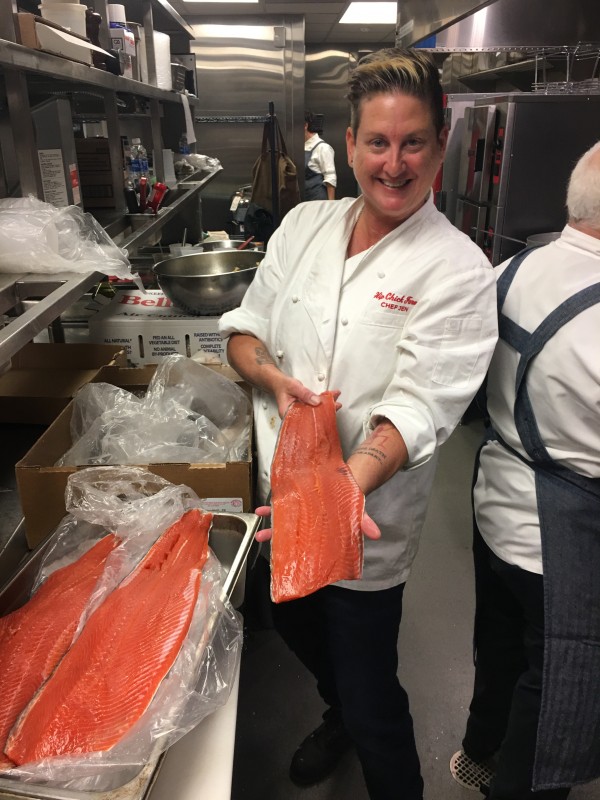
“I don’t think this all could have happened anywhere else,” said Johnson, noting that when the couple decided to leave San Francisco five years ago, they considered many other relocation options, including Portland, Oregon. “We were determined to find a farm, and here, we discovered a magical place for community. All our neighbors were so welcoming, and we’re all here because we’re so in love with it.”
Initially, the two started with a $25,000 Kickstarter campaign, “but we went through that money so fast, it was scary,” Palandech said. So she drew on her expertise as a professional charity fundraiser and called on some fellow entrepreneurs.
Indeed, it sounds a bit like an Academy Awards acceptance speech as the duo rolls out the thank-you’s they owe to local entrepreneurs. Sue Conley and Peggy Smith of Cowgirl Creamery in Point Reyes and Petaluma. Neal Gottlieb of Three Twins in Petaluma. Willie Tamayo of La Tortilla Factory in Santa Rosa. Ernie Shelton of Shelton’s Natural Foods Market in Healdsburg. A big breakthrough came when a top local executive at Whole Foods not only promptly returned Palandech’s email, he asked if he could hang out with the creative women to help strategize their next steps.
“I think people want to help other people,” Palandech said. “There’s a really deep-rooted sense of kindness in this community, with thoughtful, cultured people interested in bettering the world.”
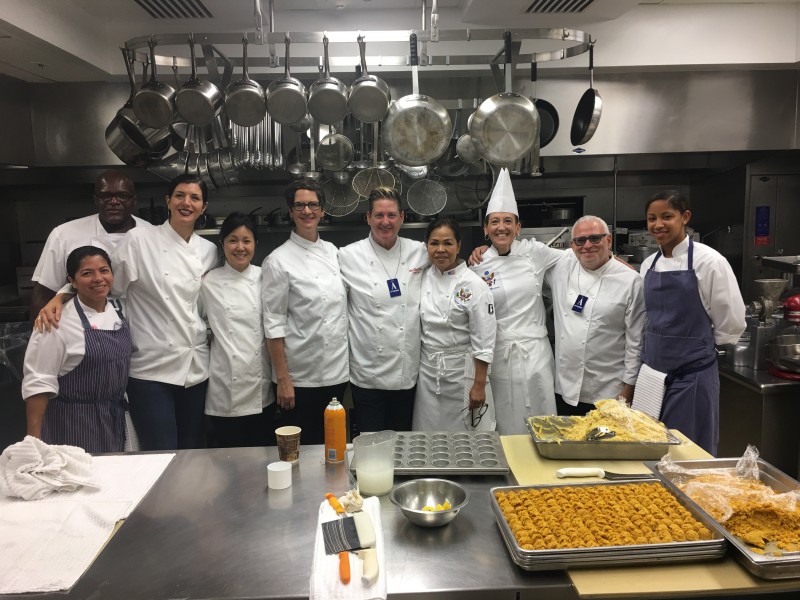
One of the more fruitful reach-outs happened when Palandech cold-called Andy and Rachel Berliner of Amy’s Kitchen, the Petaluma-based familyowned company that makes organic and non-GMO convenience and frozen foods for international distribution.
“I essentially said, ‘Can you explain the entire business?’ and they did,” said Palandech.
Among other advice, the Berliners referred her to Acosta Sales & Marketing, a Florida-based company specializing in consumer packaged goods. The Acosta team then hooked up Hip Chick with Greg Hartman, president of Oasis Sales and Marketing in Sebastopol. Oasis works with clients like Three Twins and Redwood Hill Farm and Creamery in Sebastopol. Hartman agreed to take on Hip Chick at no charge.
“I have provided pro bono consulting for numerous brands over the years,” Hartman said. “Since I don’t go to shelters to help feed homeless people, I feel I can at least make a modest contribution to young companies, and help them launch their brands. Sometimes it leads to providing our brand management services, but mostly I want to contribute.”
He chose Palandech and Johnson since he felt they were so marketable, too.
“Hip Chicks have a special story to tell, rich with their unique family, expertise in gourmet recipes and cooking,” he said. “Plus, I love their chicken wings.”

Along the way, Palandech and Johnson have worked with SCORE, a network of volunteer business mentors who provide free answers to entrepreneur questions. The group also supports other local female-owned farm businesses like Audrey Hitchcock-Ramini’s Italian water buffalo mozzarella ranch in Petaluma.
They took small business development classes, and in 2014 applied to the Whole Foods Local Producer Loan Program, scoring $35,000 at low interest, plus free mentoring, packaging consultation and coveted entry into the prominent grocery store chain. Whole Foods is well-regarded for assisting other businesses like Grindstone Bakery of Santa Rosa, Saint Benoit Creamery of Petaluma, and Lydia’s Kindfoods of Petaluma.
Hip Chick also joined Sonoma County BEST’s Food Industry Group, an association of natural and specialty food manufacturers who collaborate and share experiences and resources. Other members include Straus Organic, Three Twins, La Tortilla Factory and Amy’s.
With all this community-driven momentum, the fledgling business was really gaining traction when the unimaginable happened. Johnson was diagnosed with a brain tumor in early 2015, and the couple thought they might have to sell their farm to cover medical bills. Yet once again, a friend stepped in, giving them a sizable loan. Serendipity played a part as well, when in July of that year, they won $500,000 on the CNBC show “West Texas Investors Club,” which supports entrepreneurs.
Then, this past October, Hip Chick received a $2 million Series A investment round from Advantage Capital Agribusiness Partners. ACAP is licensed by the U.S. Department of Agriculture to partner with nine Farm Credit organizations that support small business in rural communities.
“U.S. Agriculture Secretary Tom Vilsack helped create the program so investors would understand our challenges and have patience (for returns),” said Palandech. “They found us when we displayed at Natural Products Expo West this past spring.”
Today, the women are living their Hip Chick dream at their Ramblin’ Rose farm, with Johnson back in good health. They share the bucolic property with three Shire horses, two mini donkeys, five cats, two dogs, a half-dozen pygmy goats, many pet chickens and turkeys, and a kunekune pig named Willie.
They’ve recently added organic turkey patties to their lineup, fashioned with a bit of cream, egg, onion, panko and dried apple. Johnson is tweaking ideas for bourbon-bleu cheese-fig chicken sausages, breakfast patties, and more turkey entrees.
The next goal is to get their products into local school cafeterias; they’ve already broken into the Orinda district.
“It’s important for kids to have real food, sustainably made,” Palandech said.
The duo also hopes to expand into operating their own poultry ranch, to continue the humane practices their partner farms celebrate. They’ve already learned that USDA ranching rules are very complicated, and that, as Palandech said, “it’s very cost intensive to butcher.” Perhaps they’ll find a good local adviser for that step, too.
And then, they plan to pay it all forward.
“In the business, humane animal welfare is becoming a priority,” Palandech said. “Target just asked us what we’re doing to ensure happy animals as we grow. So we’re getting to talk about compassion and transparency.
“It’s funny,” she added. “Now, we’re helping others.”


